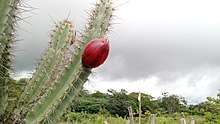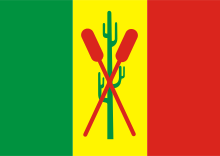Cereus jamacaru
Cereus jamacaru, known as mandacaru or cardeiro,[1] is a cactus common in the Brazilian northeast which often grows up to 5 metres (20 ft) high.
| Cereus jamacaru | |
|---|---|
| Scientific classification | |
| Kingdom: | |
| (unranked): | |
| (unranked): | |
| (unranked): | Core eudicots |
| Order: | |
| Family: | |
| Subfamily: | |
| Tribe: | |
| Genus: | |
| Species: | C. jamacaru |
| Binomial name | |
| Cereus jamacaru DC. | |
A thorn-less kind is used for animal feed. The most common kind is highly thorny but is also used for animal feed, after burning or cutting off the thorns. Mandacaru is highly drought-resistant.


The flowers are white and about 30 centimetres (10 in) long. The flower buds usually appear in the middle of spring and each flower lasts only for a night. They blossom at dusk and wither by the morning . Its fruit has a very strong violet color. The pulp is white with tiny black seeds, and it is considered very tasty. Many birds feed on them, like the "gralha-cancã" and the "periquito-da-caatinga" from Brazilian caatinga.
The mandacaru is featured on the flag of the city of Petrolina in the state of Pernambuco.
